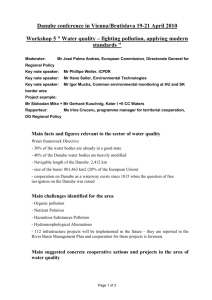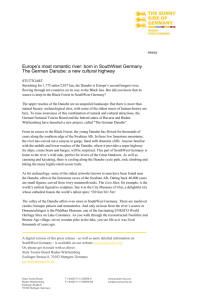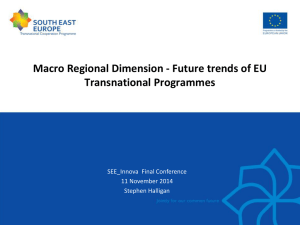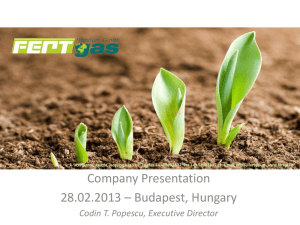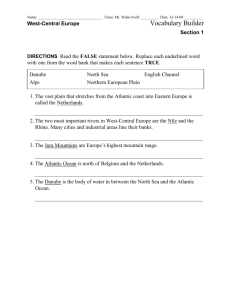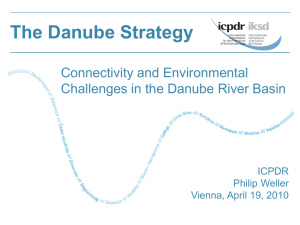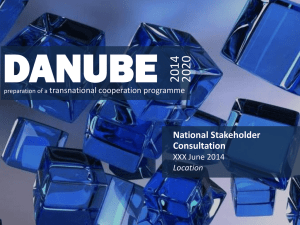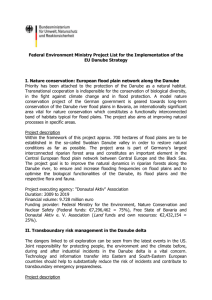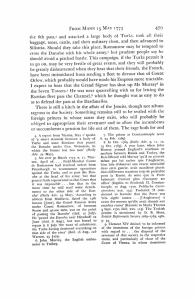Danube 2014
advertisement
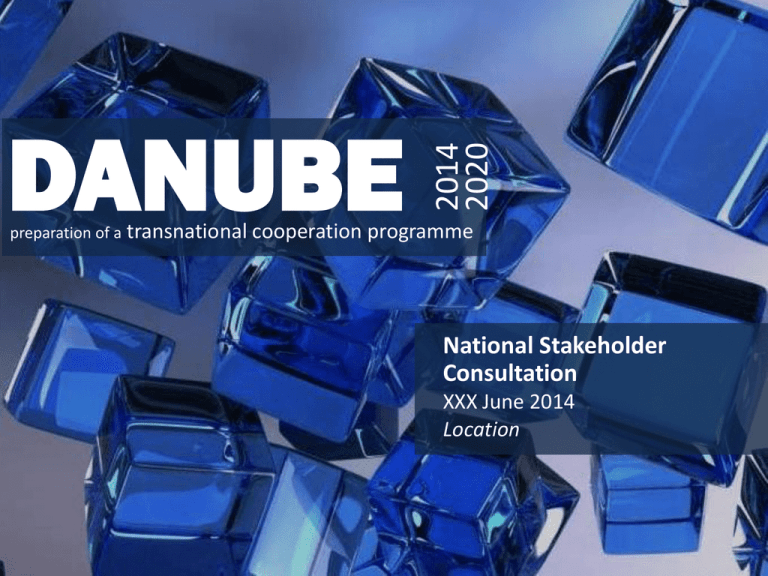
preparation of a transnational cooperation 2014 2020 DANUBE programme National Stakeholder Consultation XXX June 2014 Location Danube 2014 - 2020 14 participating countries : Scope of the programme The DANUBE transnational programme 20142020 will support projects implemented within broad transnational partnerships and focused on improving the policy making processes and institutional cooperation, rather than building hard infrastructure Envisioned management system Programme Monitoring Committee Managing Authority – ONEP Budapest, Hu Joint Secretariat – ONEP Budapest, Hu Programming methodology Territorial • A Territorial Analysis of the programme area was performed identifying the main development challenges Analysis Strategic focus In depth analysis • Based on these, the Programming Committee selected the relevant Thematic Objectives and investment priorities, as defined in ERDF Regulation • A team of external experts further refined and detailed the selected investment priorities Programming methodology Definition of Programme Strategy Public consultation Programme endorsement • Based on this, the Programming Committee defined the mission of the programme and its specific objectives, identifying the specific needs to be addressed by the Programme • “Reality check” of the programme content • Identification of types of projects the stakeholders would prefer • Based on the inputs of stakeholder consultations, finalization of the OP and submission to the EC Draft outline of the cooperation programme (status 30 May 2014) DANUBE cooperation programme 2014-2020 Policy driver and pioneer to tackle common challenges and needs PA 1 – Innovative and socially responsible Danube region PA 2 – Environment and Culture responsible Danube region Improve framework conditions and a balanced access to knowledge (1b) Natural and cultural heritage valorisation (6c) Connectivity to TEN-T (7b) Restoring and managing ecological corridors (6d) Environmentally-friendly, transport systems (7c) Transnational water management and flood risk prevention (6d) Coordinate smart energy distribution systems (7e) Improve the preparedness to manage risks (6d) Improve regional energy planning and –coordination (7e) Increase skills and knowledge for innovation (1b) PA 5 – Techn. Assistance PA 3 – Better connected Danube region Efficient & smooth implementation of the programme PA 4 – Well governed Danube region Multilevel- and transnational governance (11) Governance of the EUSDR (11) Development of innovation strategies and smart specialisation approaches Better access to innovation finance, subsidies and incentives for R&D, access to venture capital (access to finance) Joint planning and management of major research infrastructures Improved coordination of cluster policies across regions and Partner states Development of cross-linkages between enterprises, R&D institutions, higher education and the public sector (triple helix approach) Support for innovative public procurement Specific Objective 2 Increase skills and knowledge for innovation Specific Objective 1 Improve framework conditions and balanced access to knowledge Priority Axis 1 – Innovative and socially responsible Danube Region Development of innovative learning systems Increased skills of employees in the business sector to better adapt to technological change Improved education for innovative entrepreneurship Develop skills and knowledge to advance social innovation Improved transnational coordination of management of cultural and natural heritage Raise the awareness on the benefits of cultural diversity in the Danube Region Strengthen common orientations of transnational offers in the areas of tourism Specific Objective 4 Restoring and managing ecological corridors Specific Objective 3 Natural and cultural heritage valorization Priority Axis 2 – Environment and culture responsible Danube Region Improved interlinking of natural habitats within functional ecological networks Tackling significant pressures identified in the Danube River Basin District Joint monitoring of ecological and chemical status of waters Joint development of measures to improve water quality and ecological status Joint management of flood risks Building awareness for joint environmental action (e.g. communication to the public and specific target groups) Specific Objective 6 Improve the preparedness of managing risks Specific Objective 5 Transnational water management and flood risk prevention Priority Axis 2 – Environment and culture responsible Danube Region Establishment of more effective governance systems for emergency situations Development of integrated actions for adaptation to the consequences of climate change Coordination and preparation of strategic investments in regional transport infrastructure Removal of “non-infrastructural” bottlenecks in regional mobility Capacity-building and training for management of regional mobility and connectivity Specific Objective 8 Environmentallyfriendly, low-carbon and safe transport systems Specific Objective 7 Planning, coordination and management of regional transport systems Priority Axis 3 – Better connected Danube Region Increasing multimodality, interoperability and promoting the shift to more environment-friendly modes of transport Promote sustainable freight transport in the Danube region Promote sustainable metropolitan transport systems and mobility Developing a Danube Region Smart Grid Concept Specific Objective 10 Improve regional energy planning and coordination Specific Objective 9 Coordinate smart energy distribution systems Priority Axis 3 – Better connected Danube Region Further develop the Danube region gas supply model Develop a Danube region biomass action plan Develop Danube region energy efficiency concepts Sustainable development of the hydropower generation potential of the Danube river Institutional cooperation in the field of labour market policies and education&training programmes Institutional cooperation in the field of demographic changes and migration challenges Institutional cooperation in the field of inclusion of marginalized groups, including Roma Institutional cooperation in the field of civil society and development programmes Institutional cooperation in the field of integration of metropolitan regions in the Danube area Institutional cooperation in security issues, crime prevention Specific Objective 12 Improve the governance of EUSDR and complex transnational project development Specific Objective 11 Strengthen multilevel and transnational governance in areas with major societal problems Priority Axis 4 – Well governed Danube Region Direct support to EUSDR governance in each of its Priority Areas Facilitating the development of complex strategic transnational projects by establishing a seed money/project development fund facility Establishment of an EUSDR Focal Point to facilitate the information flow between EUSDR key actors Are the fields of action relevant? If not, why? CONTRIBUTIONS Do you have a project idea that would fit into the DANUBE Transnational Programme? Do you have any general comment related to the content of the programme? Result of the public consultation process 1. Comments and project ideas “harvested” (here and in other national events) 2. Collected information analysed (by the experts team) 3. Findings discussed (in the framework of the Programme Committee) 4. New draft of cooperation programme prepared (and submitted to the EC) Next steps in programming process July 2014 • Public consultati ons June 2014 • New draft of the OP September 2014 • Ex-ante Evaluation and SEA July and August 2014 • Final OP and national approval • Submission to the EC 22nd of September 2014 THANK YOU VERY MUCH FOR YOUR KIND ATTENTION!
